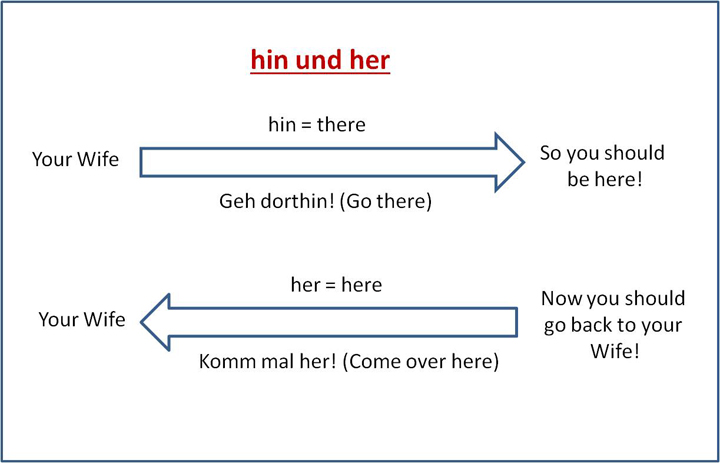‘Hin and her’ in German
Posted: Wed Mar 11, 2015 8:41 pm
Both ‘hin’ and ‘her’ are adverbs and often used with verbs gehen (go), kommen (come) and fahren (drive).
Literally
‘hin’ means there and
‘her’ means here
In its simplest usage,
‘hin’ refers to a movement away from the speaker towards a new location/position/destination, while
‘her’ refers to a movement towards the speaker from another location.

Examples:
Wohin gehst du? – Where are you going (to)?
Woher kommst du? – Where do you come from?
Fährst du nach Berlin? – Are you driving to Berlin?
Ja, ich fahre dorthin – Yes, I will drive there.
Schau mal hin – Look over there
Schau mal her – Look over here
Seit Jahren wohnen meine Eltern in Paris. Einmal im Jahr reise ich dorthin um sie zu besuchen – For years my parents are living in Paris. Once a year I trvel there to visit them.
A short conversation:
Tobias: Erzähl mal, wo kommst du her? (Tell me, where do you come from?)
Sina: Ich komme aus dem Sudan. Als ich 10. Klasse war brach der Krieg aus und ich bin geflohen. Nach einem langen Weg bin ich hierher gekommen.
(I am from Sudan. When I was in class 10, war broke out and I fled. After a long journey I came here)
der Krieg - war
verbs: ausbrechen, brach aus, ausgebrochen (to break out, broke, broken)
fliehen, floh, geflohen (to flee, fled, fled or to escape, escaped, escaped)
Something more:
‚hin‘ and ‚her‘ combine with a number of prepositions (auf, aus, unter, über etc.) or used as prefixes to make new words indicating directions, e.g
hinauf – upwards------------herauf – downwards
hinüber – over--------------- herüber – over
hinunter – under-------------herunter – under
hinaus – out of---------------heraus – out of
hinein – inside----------------herein – inside
Examples:
Bitte kommen Sie herein – Please come in (here)
Bitte gehen Sie in das Zimmer hinein – Please go inside that room [It also make a complete sense without ‚hinein‘ - Bitte gehen Sie in das Zimmer‘]
Komm heraus! – Come outside (to me). In colloquial form Komm raus – come out
Geh hinaus – Go outside (to play for example). In colloquial form Geh raus – go outside
Klaus kommst du bitte mal die Treppe herunter, ich brauche deine Hilfe! – Klaus will you please come down (the stairs), I need your help!
Ich gehe die Treppe hinauf, um zu gucken was auf dem Dach los ist – I go up the stairs to see what’s going wrong on the roof.
‘hin’ and ‘her’ also form different idiomatic expressions:
hin und her – back and forth, here and there, or to and fro
hin und wieder – now and then
Der betrunkene Mann rennt hin und her – The drunked man runs to and fro (here and there)
Verb: rennen, rannte, gerannt (to run, ran, run)
Literally
‘hin’ means there and
‘her’ means here
In its simplest usage,
‘hin’ refers to a movement away from the speaker towards a new location/position/destination, while
‘her’ refers to a movement towards the speaker from another location.

Examples:
Wohin gehst du? – Where are you going (to)?
Woher kommst du? – Where do you come from?
Fährst du nach Berlin? – Are you driving to Berlin?
Ja, ich fahre dorthin – Yes, I will drive there.
Schau mal hin – Look over there
Schau mal her – Look over here
Seit Jahren wohnen meine Eltern in Paris. Einmal im Jahr reise ich dorthin um sie zu besuchen – For years my parents are living in Paris. Once a year I trvel there to visit them.
A short conversation:
Tobias: Erzähl mal, wo kommst du her? (Tell me, where do you come from?)
Sina: Ich komme aus dem Sudan. Als ich 10. Klasse war brach der Krieg aus und ich bin geflohen. Nach einem langen Weg bin ich hierher gekommen.
(I am from Sudan. When I was in class 10, war broke out and I fled. After a long journey I came here)
der Krieg - war
verbs: ausbrechen, brach aus, ausgebrochen (to break out, broke, broken)
fliehen, floh, geflohen (to flee, fled, fled or to escape, escaped, escaped)
Something more:
‚hin‘ and ‚her‘ combine with a number of prepositions (auf, aus, unter, über etc.) or used as prefixes to make new words indicating directions, e.g
hinauf – upwards------------herauf – downwards
hinüber – over--------------- herüber – over
hinunter – under-------------herunter – under
hinaus – out of---------------heraus – out of
hinein – inside----------------herein – inside
Examples:
Bitte kommen Sie herein – Please come in (here)
Bitte gehen Sie in das Zimmer hinein – Please go inside that room [It also make a complete sense without ‚hinein‘ - Bitte gehen Sie in das Zimmer‘]
Komm heraus! – Come outside (to me). In colloquial form Komm raus – come out
Geh hinaus – Go outside (to play for example). In colloquial form Geh raus – go outside
Klaus kommst du bitte mal die Treppe herunter, ich brauche deine Hilfe! – Klaus will you please come down (the stairs), I need your help!
Ich gehe die Treppe hinauf, um zu gucken was auf dem Dach los ist – I go up the stairs to see what’s going wrong on the roof.
‘hin’ and ‘her’ also form different idiomatic expressions:
hin und her – back and forth, here and there, or to and fro
hin und wieder – now and then
Der betrunkene Mann rennt hin und her – The drunked man runs to and fro (here and there)
Verb: rennen, rannte, gerannt (to run, ran, run)